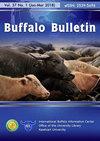Estrus and ovulation synchrony of buffaloes (Bubalus bubalis): A review
IF 0.2
4区 农林科学
Q4 AGRICULTURE, DAIRY & ANIMAL SCIENCE
引用次数: 0
Abstract
Synchronizing estrus and ovulation in buffalo using timed inseminations (TAI) protocols circumvents the limitations associated with estrus detection. Spontaneous estrus in buffalo may achieve more conception rate on insemination than those subjected to synchronization of estrus and timed insemination (TAI). The advantages of insemination following synchronization programs include higher detection rates combined with decreased embryonic losses and reduction in days open. A synchonization programme should ensure control of estrus cycle which entirely depends on ovarian status of animals before starting any protocol. Ovarian follicular status at the beginning of treatment protocols plays vital role for effective response shown by animals. Studies show that more precise alterations in follicular waves may be needed to achieve better synchrony of ovulation and more fertility. The protocols which use Gonadotropic Releasing Hormone (GnRH), follicle stimulating hormone (FSH), luteinizing hormone (LH), equine chorionic gonadotropin (eCG), human chorionic gonadotropin (hCG), prostaglandins, progesterone and estradiol have been helpful in achieving the estrus and ovulation synchrony. Use of estradiol esters and progesterone per-vaginum implants have also been incorporated in synchronization programs. Synchronous emergence of follicular waves using trans-vaginal ultrasound guided follicular ablation and estradiol administration is a recent concept for synchronization in buffalo. Further, a recent approach has been to allow the follicle of second follicular wave to ovulate as the fertility has been lesser when first wave follicle ovulates. Moreover, controlling environmental influences, nutritional and managemental strategies remain pre-requisite to achieve desired goals though hormonal administration. This is more particular in buffaloes suffering from anestrum more so in low or non-breeding season and pre-pubetal anestrum. This review will cover the available documented literature regarding estrous cycle physiology with emphasis on follicular wave dynamics and the future area of work to be focused to achieve more reproductive efficiency in buffalo.水牛(Bubalus bubalis)的发情和排卵同步性研究进展
在水牛使用定时授精(TAI)协议同步发情和排卵绕过了与发情检测相关的限制。水牛自发发情比同期发情和定时授精(TAI)的受精率更高。授精后同步程序的优点包括更高的检出率,减少胚胎损失和减少开放天数。一个同步方案应确保控制发情周期,发情周期完全取决于动物的卵巢状态,然后再开始任何方案。在治疗方案开始时,卵巢卵泡状态对动物显示的有效反应起着至关重要的作用。研究表明,更精确的改变卵泡波可能需要实现更好的同步排卵和更多的生育能力。使用促性腺激素释放激素(GnRH)、促卵泡激素(FSH)、促黄体生成素(LH)、马绒毛膜促性腺激素(eCG)、人绒毛膜促性腺激素(hCG)、前列腺素、孕酮和雌二醇的方案有助于实现发情和排卵的同步。使用雌二醇酯和孕酮阴道植入物也被纳入同步程序。利用经阴道超声引导的卵泡消融和雌二醇给药同步出现卵泡波是水牛最近的同步概念。此外,最近的一种方法是允许第二波卵泡排卵,因为第一波卵泡排卵时生育能力较低。此外,控制环境影响、营养和管理战略仍然是通过激素管理实现预期目标的先决条件。这在低度或非繁殖期和耻骨前无月经的水牛中更为明显。这篇综述将涵盖现有的关于发情周期生理学的文献,重点是卵泡波动力学和未来的工作领域,以提高水牛的生殖效率。
本文章由计算机程序翻译,如有差异,请以英文原文为准。
求助全文
约1分钟内获得全文
求助全文
来源期刊

Buffalo Bulletin
AGRICULTURE, DAIRY & ANIMAL SCIENCE-
CiteScore
0.50
自引率
0.00%
发文量
53
审稿时长
>12 weeks
期刊介绍:
Buffalo Bulletin is published quarterly in January-March, April-June, July-September and October-December. Contributions on any aspect of research or development, progress reports of projects and news on buffalo will be considered for publication in the bulletin.
 求助内容:
求助内容: 应助结果提醒方式:
应助结果提醒方式:


